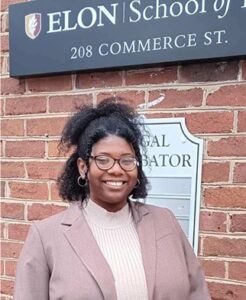
On the evening of May 20th, the Elon Small Business & Entrepreneurship Clinic attended LaunchLab Growth Spring Demo Day at Elm & Bain (https://elmandbain.com/) in downtown Greensboro. This event was an ideal opportunity for aspiring entrepreneurs to “pitch” their company to a panel of judges with the chance of winning $500 to put towards growing their business. Among the 11 entrepreneurs giving their pitch, there were companies centered around video gaming, guidance counseling, children’s clothing, and even dog training.
LaunchLab Growth Spring Demo is an event held by the Greensboro Chamber of Commerce (https://greensboro.org/) that is free to attend and open to the public. Each small business owner and start-up has been preparing for this event every Monday for 14 weeks. Although there are no current openings for new companies looking to pitch their entrepreneurial ideas, event organizer, Kaitlin Conover is available to connect with anyone looking for more information on the event.
Demo Day began at 5pm where attendees and presenters were invited to register and receive a name tag at the front desk. After registering, attendees and presenters mingled in the event hall while enjoying tasty refreshments and drinks at the open bar. Each small business owner and start-up had set up tables to share their products and services to attendants.
Soon afterwards, attendants gathered in the Elm & Bain event hall to hear each entrepreneur’s pitch. All 11 entrepreneurs were given a strict four minutes to present their company to the audience. Although nerve-wracking, their ability to present to fellow entrepreneurs in the Triad region proved to be invaluable and an excellent opportunity to network with like-minded people.
This season’s winner of the $500 prize was ……. Astrid & Friends!
Astrid & Friends (https://astridandfriends.com/) is a company that ethically produces handmade children’s clothing that “breaks the mold”. Inara, the owner of Astrid & Friends delivered an excellent presentation that showcased her passion for this type of work. This passion and her message resonated with the judges and she walked away with $500 to use however she likes towards her small business.
After the presentations were complete, the networking began. All presenting entrepreneurs welcomed attendants to approach their tables and learn more about their respective companies. Caroline Decarvalho, an Elon Law Small Business Resident, purchased a product from “Molten Makerspace” https://moltenmakerspace.com/ which provides diverse classes and uses its “maker equipment” to transform hobbies into careers. Dara Alper, owner of Molten Makerspace, assisted Ms. Decarvalho in purchasing a handmade “axolotl” figurine which is a salamander-like creature native of Mexico. Below is Ms. Decarvalho with a picture of her new friend, “Clio”.

Moving forward, entrepreneurs, both established and aspiring, should monitor registration availability for future LaunchLab Growth Spring Demo Day. It is an excellent opportunity, even for those not presenting. One of our favorites was Rolling Video Games NC (https://www.rollingvg.com/). Imagine video games but on wheels.

Check out this link for more information on the LaunchLab Growth Demo Day and to see the other small businesses:
For help with your small business’s legal needs, contact the clinic at businessclinic@elon.edu.










